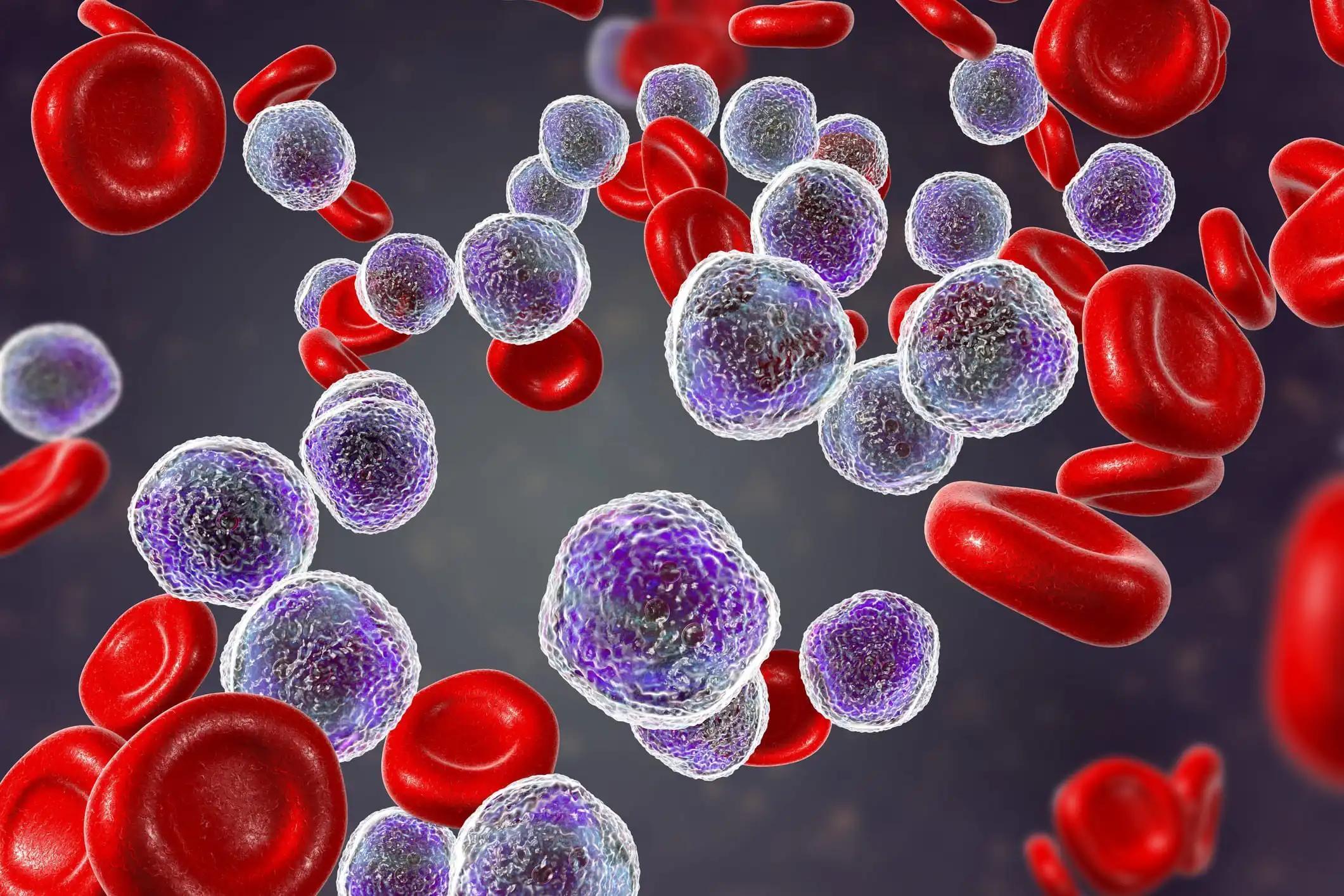KEY TAKEAWAYS
- The phase II trial studied the impact of standard chemotherapy + Quizartinib vs. PBO in adult patients with newly diagnosed FLT3-ITD WT AML.
- The study suggested that incorporating Quiz into the standard 3+7 chemotherapy regimen may offer a potential benefit in terms of OS for newly diagnosed patients with FLT3-ITD WT AML.
Incorporating oral targeted agents that inhibit FLT3 and other kinases into standard chemotherapy regimens has the potential to enhance treatment outcomes for medically fit patients (pts) with FLT3 wild-type (WT) acute myeloid leukemia (AML).
Findings from the randomized SORAML trial conducted by the SAL group, which included both FLT3-ITD mutated and WT pts, demonstrated that the addition of the type II inhibitor sorafenib improved leukemia-free survival but did not significantly impact the overall survival (OS) in newly diagnosed, medically fit AML pts. Quizartinib (Quiz), a potent type II inhibitor, has shown complete remission (CR) when used as a monotherapy in relapsed/refractory AML cases. Given these observations, the PETHEMA group designed a randomized, double-blind, placebo (PBO)-controlled phase II trial known as QUIWI.
The trial aimed to compare event-free survival (EFS), defined as failure to achieve CR/CRi after 1 or 2 cycles, death in CR/CRi, or relapse (whichever occurs first), between the Quiz and PBO arms. Researchers reported a preplanned interim analysis conducted 12 months after the final patient was enrolled.
The study involved a multicenter, randomized, PBO-controlled, double-blinded phase II clinical trial. Patients with newly diagnosed FLT3-ITD WT AML, aged 18 to 70 years, and considered fit for intensive chemotherapy were centrally screened for FLT3-ITD status before randomization. The trial comprised two phases: an open-label safety run-in phase that determined the dosage of Quiz (60 mg/day x 14 days) in conjunction with Cytarabine 200 mg/m2 (days 1-7) and Idarubicin 12 mg/m2 (days 1-3) followed by the double-blinded phase where pts were randomized at a 2:1 ratio, stratified by age at diagnosis. A second identical induction cycle was permitted if CR/CRi was not achieved after the first cycle. Consolidation therapy (up to 4 cycles) included high-dose Cytarabine on Days 1, 3, and 5 plus Quiz or PBO for 14 days. Patients with high genetic or intermediate risk with minimal residual disease (MRD) positivity were recommended for allo-SCT. A 12-cycle maintenance phase with 60 mg Quiz or PBO commenced after consolidation or allo-SCT.
MRD monitoring was carried out through the PETHEMA centralized platform. Patients with NPM1 and CBF mutations underwent MRD assessment using standardized RT-qPCR techniques, while the other subgroups were evaluated using standardized multiparametric flow cytometry.
Between September 2019 and November 2021, 284 pts were enrolled in 45 Spanish PETHEMA centers, with 11 participating in the safety run-in phase to establish 60 mg/day of Quiz or PBO. Of these, 273 pts were randomized to receive Quiz (n=180) or PBO (n=93). The baseline patient and disease characteristics were reported to be well-balanced between the two groups. As of the data cutoff date in February 2023, the median follow-up duration was 17 months.
The analysis revealed that the median EFS was 16.6 months with Quiz versus 10.6 months with PBO, although this difference did not reach statistical significance (hazard ratio [HR] 0.729; 95% CI 0.522-1.018; two-sided P=0.062). In terms of OS, Quiz demonstrated a median OS that was not reached, compared to 15 months with PBO (HR 0.558; 95% CI 0.373-0.834; P=0.004), and the 2-year OS rate was 63.5% with Quiz versus 47% with PBO. Disease-free survival was also superior with Quiz compared to PBO, with CR/CRi rates after 2 cycles being similar between the two groups. MRD negativity was achieved in a similar proportion of pts in both arms. Notably, the study observed no new safety concerns in the Quiz arm.
The study suggested that adding Quiz to the 3+7 chemotherapy regimen may extend OS in newly diagnosed FLT3-ITD WT AML pts. Additional analyses with a large biomarker plan to elucidate the fundamental molecular mechanisms and final analyses with longer follow-ups are anticipated to provide further insights and will be reported by the end of 2023.
Clinical Trial: https://classic.clinicaltrials.gov/ct2/show/NCT04107727
Montesinos, P., Rodríguez-Veiga, R., Burgues, J.M.B., Algarra, L., Botella, C., Antonio, P.S.J., Bernal, T., Tormo, M., Robles, M.C., Salamero, O., Serrano, J., Noriega, V., López-López, J.A., Polo, S.V., Colorado, M., Lorenzo, J.L.L., Vidriales, M.B., Boyero, R.G., Olave, M., Herrera-Puente, P., Arce, O., Garcia, M.B., Lloris, M.J.S., Polo, M., Roncero, M.I.G., Barragan, E., Diaz, R.A., Chillon, M.C., Calasanz, M.J., Boluda, B., Martinez-Cuadrón, D., Labrador, J. PRELIMINARY RESULTS OF QUIWI: A DOUBLE BLINDED, RANDOMIZED CLINICAL TRIAL COMPARING STANDARD CHEMOTHERAPY PLUS QUIZARTINIB VERSUS PLACEBO IN ADULT PATIENTS WITH NEWLY DIAGNOSED FLT3-ITD WILD-TYPE AML. EHA Library. Montesinos P. 06/08/2023; 387830; S130.



